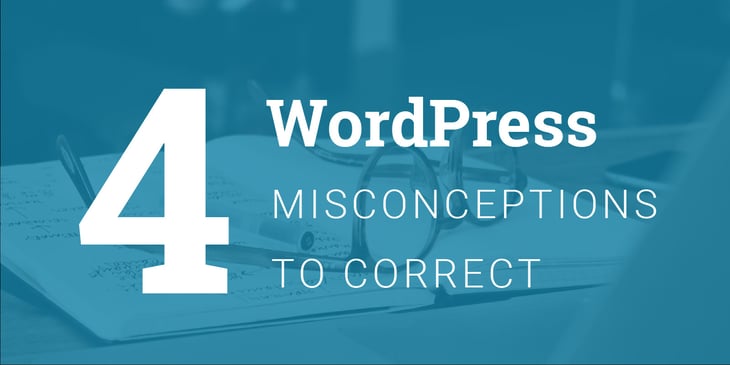
Back in 2003, the 3rd Gen iPod had just been released, "In Da Club" by 50 Cent was the #1 song AND WordPress was launched. How could you forget? Obviously a lot has changed since then, especially in regards to technology and the internet. 14 years ago WordPress began as one of the first self-hosted blogging platforms and has since evolved into the most widely-used CMS in the world. However, some still view it as the platform it once was and not the one it has become, leading to some widespread misconceptions. We'd like to correct those.
1. "The WordPress admin is not easy to use"
Most of the time we hear this it's when someone previously used a WordPress website and found it hard to update. This can certainly happen but it is not necessarily WordPress itself that is the issue. Usually back-end administration problems stem from how the original developer set the site up, an outdated install or lack of training. These issues can be mitigated by hiring an expert WordPress developer or agency that builds your website in an easier-to-use fashion and provides proper support.
For example, here at ArcStone we often use the Pods plug-in for any custom content types or fields. So, for example, if you have a staff page with detailed profiles, we may set up a Staff custom post type that allows you to easily manage and add that content in a clearly defined section of the admin.
2. "WordPress is for content driven websites only"
Most people have finally shaken the idea that WordPress is just a blogging platform, however, many still view it as being primarily for content-driven marketing websites. Although it is a great fit for those types of sites, this misconception undermines the power and flexibility that WordPress now offers. If your website needs strong content marketing AND some custom functionality or integrations, WordPress is probably a good fit. In the past year alone we have worked on WordPress websites with:
(Click on the links to view the live sites using these features)
Of course there are exceptions, but 90% of the RFPs and functionality outlines that I go through are a great fit for WordPress.
3. "WordPress is not great at eCommerce"
Let's be clear, I would not argue that WordPress is the #1 eCommerce platform out there. There are quite a few that focus primarily on eCommerce such as Shopify and Magento. However, we have found WordPress to work great for eCommerce when there are less than a few hundred products and the site also needs a strong content platform. We have used the WordPress eCommerce plug-in called WooCommerce for several websites like this music publisher and this organic soap company.
4. "WordPress does not handle large or high traffic websites"
The easy answer is that if TechCrunch, The New Yorker and BBC America can use the platform, why can't your high traffic website? But it's also important to keep in mind that those websites are likely WordPress VIPs and have a team of internal developers. A WordPress VIP means they use the enterprise platform that provides more support to both high traffic and high profile websites. However, even if you aren't a WordPress VIP, the CMS itself can definitely handle large, complex and high traffic websites. This Quora answer provided by Mario Peshev offers many considerations when weighing WordPress against other platforms for your complex website.
Long story short, WordPress is constantly evolving and getting better. Although definitely one of the best content management systems out there in terms of content publishing and promotion, it can handle complex functionality and integrations as well. Before writing this platform or others off completely, find a trusted developer or agency to assess your needs and point you in the right direction.
Check out our other related WordPress posts and case studies: